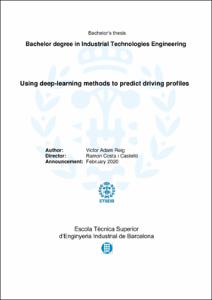Using deep-learning methods to predict driving profiles

Visualitza/Obre
Estadístiques de LA Referencia / Recolecta
Inclou dades d'ús des de 2022
Cita com:
hdl:2117/178035
Tipus de documentTreball Final de Grau
Data2020-02-05
Condicions d'accésAccés obert
Llevat que s'hi indiqui el contrari, els
continguts d'aquesta obra estan subjectes a la llicència de Creative Commons
:
Reconeixement-NoComercial-CompartirIgual 3.0 Espanya
Abstract
Due to high number of vehicles, the greenhouse gases in the atmosphere have reached thehighest level. If it is compared a Fuel Cell Hybrid Electric Vehicle (FCHEV) to conventional Internal Combustion Engine (ICE) vehicles or Hybrid Electric Vehicles (HEVs), the first group has zero greenhouse gas emissions, and for that reason is a better alternative. Regarding All Electric Vehicles (AEVs) the charging time is longer which is a negative point. A fully charged battery from an AEV for example gives less range if it is compared to a FCHEV with a full hydrogen tank. So basically, the main advantages of FCHEV compared to AEV are: a quicker filing in of the tank and more autonomy. The most common used fuel cell(FC)is the Proton Electron Membrane FuelCell (PEMFC). The main problem of this type of FCis the slow current dynamics which leads for not being suitable for the sole power source in a vehicle. Therefore, the FCHEV is the best option, and by upgrading the power management system(PMS)in the proper way, the car’s performance can be improved.This bachelor’s thesisstudies the integration ofa neural network (NN) to a FCHEV. The objective is to analyze the effect of integrating NN on the PMSof FCHEV and try to improve its efficiencyby predicting the driving profiles.A model to simulate the physical behavior of FCHEV has been looked for in MathWorks webpage by using MATLAB/Simulink software as a tool for simulation. All the parts of the model have been studied forbetter comprehension onhow it works and for future modifications in order to implement the NN. Results shows that by implementing NN using the Time Series app from MATLAB, adrivingprofilecan be predicted with an acceptableerror, which means that afterget prepared the NN by trainingwith lot ofdata, the powereconomy can be improved by modifying the controller parameters. Moreover, this solution let to increase the life of the battery
MatèriesHybrid electric vehicles, Fuel cells, Neural networks (Computer science), Predictive control, Vehicles elèctrics híbrids, Piles de combustible, Xarxes neuronals (Informàtica), Control predictiu
TitulacióGRAU EN ENGINYERIA EN TECNOLOGIES INDUSTRIALS (Pla 2010)
| Fitxers | Descripció | Mida | Format | Visualitza |
|---|---|---|---|---|
| bachelor-thesis-victor-adam.pdf | 1,462Mb | Visualitza/Obre |


